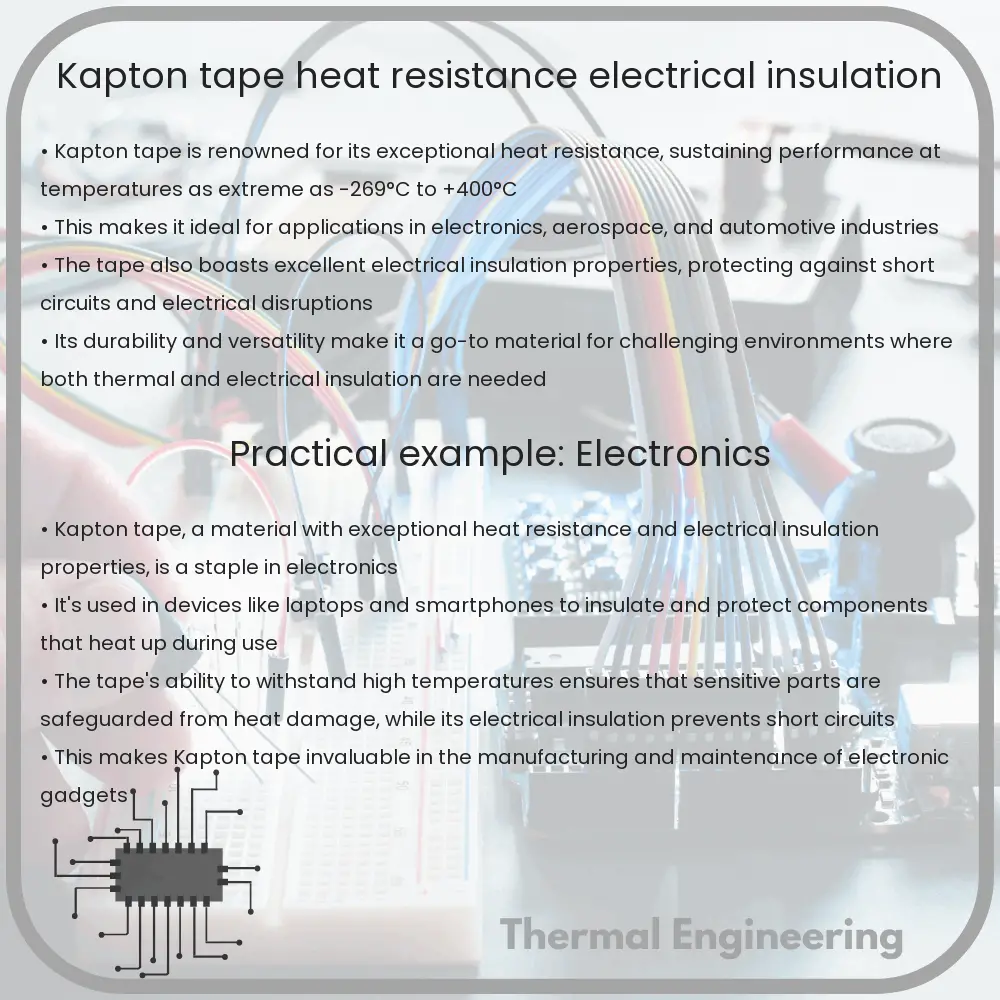Learn about Kapton tape, its uses in aerospace and electronics, and its unique heat resistance and electrical insulation properties.

Understanding Kapton Tape: Heat Resistance and Electrical Insulation
Kapton tape, a remarkable material known for its durability and versatility, plays a crucial role in various engineering applications, specially where high heat resistance and excellent electrical insulation are required. This polyimide film was developed by DuPont in the 1960s and has become indispensable in a number of high-stakes environments such as in aerospace, electronics, and automotive industries.
Heat Resistance
Kapton tape can withstand extreme temperatures, making it highly suitable for applications that are exposed to high heat. It can operate at temperatures as low as -269°C and as high as 400°C without degrading. This property makes Kapton tape an ideal choice for insulating circuit boards, protecting sensitive components during soldering processes, and even insulating spacecraft against the harsh conditions of space.
The science behind its high heat tolerance lies in the stability of the polyimide polymer which makes up the tape. Polyimides maintain their excellent mechanical properties over a large temperature range due to their aromatic and imide functional groups, which provide strong molecular stability and high heat resistance.
Electrical Insulation
Another standout feature of Kapton tape is its excellent electrical insulation properties. It has a high dielectric strength, typically around 8000 volts per mil. This characteristic is crucial in preventing electrical discharges and short circuits in a variety of electrical and electronic equipment.
- Dielectric Strength: Maintains a high level of insulation even when subjected to high temperatures.
- Thin and Lightweight: Does not add significant bulk or weight to assemblies, which is particularly valuable in aerospace and electronic applications.
- Chemical Resistance: Resistant to many solvents and acids, which enhances its durability in hostile environments.
The use of Kapton tape is particularly prevalent in the construction of electronic components such as capacitors and gold leaf shielding in spacecraft. Its ability to maintain insulative properties at varied temperatures helps in the efficient functioning of these components in varying and extreme environmental conditions.
Applications of Kapton Tape
- Aerospace: Used in satellites and spacecraft due to its resistance to ultraviolet (UV) and atomic oxygen which are prevalent in space environments.
- Electronics: Commonly used to hold parts in place during wave soldering and other high-temperature processes associated with electronic assembly.
- Automotive: Helps in insulation of electrical systems and components, which are subject to high temperatures, such as in engine compartments.
Understanding the properties and applications of Kapton tape helps in appreciating its role in modern technology. Its development marked a significant advancement in materials engineering, combining heat resistance, electrical insulation, and chemical stability in one effective material. As technologies evolve and operating conditions become more demanding, the role of materials like Kapton tape is likely to become even more critical.
Whether it’s enabling the exploration of outer space or ensuring the reliable operation of your everyday electronic devices, Kapton tape continues to be an essential component in various fields of engineering.